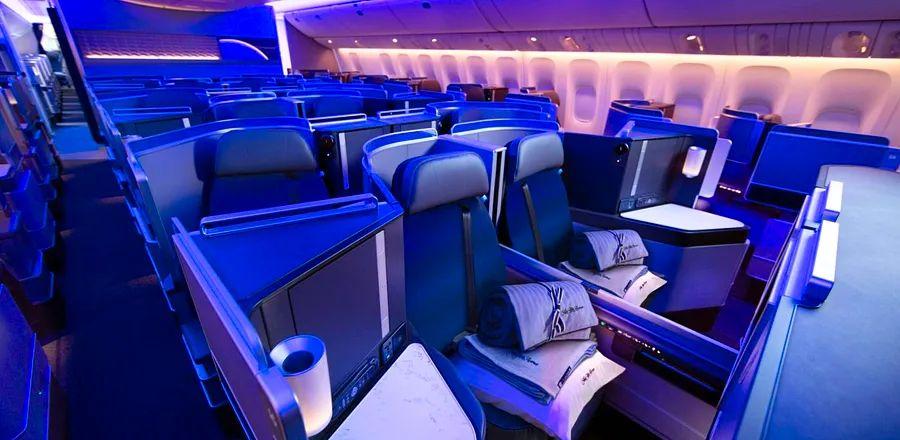Reasons Behind Airlines' Major Investment in Premium Seating

In the last ten years, airlines have rolled out seats and suites that offer five-star hotel comfort, featuring amenities like sliding privacy doors, gourmet dining, and luxurious bedding that competes with top hotels.
Innovation in the industry shows no signs of slowing: Emirates has launched a new premium economy cabin, marking a first for a Middle Eastern airline; United has recently revealed its most extensive upgrade to Polaris business class since its debut in 2016; and Delta is in the process of enhancing its Delta One ground experience and opening new lounges. This is just the beginning.
Premium leisure travelers who have experienced front-of-cabin seating in recent years—many for the first time—are now looking for even more lavish in-flight experiences. Once you've enjoyed the luxury of the front, it's tough to return to the back. However, there's a catch: the days of empty cabins and rock-bottom prices for premium seats during the pandemic are over. The surge in travel demand has brought back the high prices for first and business class tickets.
“During the pandemic, lower prices allowed many to experience premium seating, and now they want more,” says Edward Russell, an aviation analyst and reporter at Skift. Even with airfare spikes this past summer, flights continued to depart fully booked as airlines recorded significant profits.
Here's the reality: Recent years have demonstrated that leisure travelers are more than willing to invest in premium experiences, often more than airlines initially anticipated. This shift means that airlines are not only reevaluating their offerings in first, business, and premium economy but are also rapidly adding more seats and luxurious amenities.
The straightforward reason behind airlines' significant investment in high-end onboard experiences? It generates substantial revenue, and passengers are eager to pay for it.

Courtesy of Emirates
Premium economy represents the future of air travel.
Although it may not be the most glamorous option, the premium economy cabin serves as a balanced choice between business and economy class, playing a significant role in the industry's strategic evolution.
American Airlines was the pioneer among U.S. airlines, introducing long-haul premium economy in 2016, a segment that is rapidly expanding across the market. Next year, they will unveil a new second-generation premium economy seat featuring enhanced privacy and twice the in-seat storage.
Delta Air Lines highlighted in its latest earnings call that premium economy, referred to as Premium Select, has become a vital driver of record international profits. Meanwhile, United Airlines reported that revenue from its premium economy section (Premium Plus) surged sevenfold in the third quarter of 2023 compared to 2019 figures.
It's not only U.S. airlines investing heavily in this service category. Emirates joined the premium economy trend in late 2022, and after a year, it launched its offering in the United States this past spring. Overall, the Dubai-based airline plans to add 1,608 premium economy seats to its fleet of 67 Airbus A380s and 1,032 seats to its 53 Boeing 777s.
Investments in business and first class.
The majority of airline profits come from the sale of business and first-class tickets. According to Russell, "The industry's commitment to premium offerings clearly reflects their appreciation for the revenue generated by premium travelers." There are numerous developments in this area as well.
This fall, Japan Airlines introduced its latest flagship aircraft, the Airbus A350-1000, featuring a double bed in first class and, for the first time in its history, privacy doors in business class.
Later this year, Air France is set to launch the longest first-class suite available, boasting five windows and an expansive modular layout. Fabien Pelous, Air France’s SVP of customer experience, describes it as "an ambitious endeavor that exemplifies the elegance and excellence inherent to Air France." This follows Air France's recent enhancements to its business-class service.
For Lufthansa, a $2.7 billion initiative known as Allegris is designed to revolutionize long-haul travel. Carsten Spohr, CEO of Lufthansa Group, remarked, "After nine years in this role, this is the first time my team has indicated the need to expand first class. I never expected to hear that."
In the U.S., American Airlines is enhancing its business-class service by incorporating suite doors and adding 18 more lie-flat seats to its Boeing 777-300ER aircraft. This translates to a 43 percent increase in premium seating from now until 2026, according to American’s CEO, Robert Isom.
Delta is reaping the rewards of its extensive investments in premium services over the years. CEO Ed Bastian noted during Delta’s Q3 earnings call, "With our unique premium revenue strategy and robust global network, we are poised to maintain industry-leading profitability." The airline saw a 17 percent increase in premium revenue compared to the previous year.

Courtesy of Lufthansa
Delta has defended its substantial (and contentious) modifications to its frequent flier program partly because of an overwhelming number of premium passengers. Bastian stated, "The growth in our premium customer base surpasses the premium offerings we have available." He added, "We are working to better balance and ensure our premium customers receive the service levels they deserve."
What is the impact on economy passengers?
Major airlines are increasingly shifting towards larger and more modern first-class, business, and premium economy cabins. But what does this mean for economy passengers? The outlook is somewhat mixed.
Airlines often manage to maintain the same number of economy seats even while expanding premium cabins. According to Russell, this is typically achieved by reducing seat pitch—the space between seats—or by installing smaller lavatories to accommodate an additional row. As a result, the growth in premium offerings often leads to tighter conditions in economy.
While airlines like Delta and Lufthansa concentrate on the more profitable premium market, Russell suggests that this shift may present low-cost carriers, such as French Bee and Norse Atlantic, with the chance to attract more budget-conscious travelers. Thus, economy flyers will still have opportunities for deals, albeit possibly not with their preferred airline.
In the meantime, airlines are implementing subtle yet significant enhancements for all passengers, regardless of their cabin class. For instance, United is adding Bluetooth connectivity to every seat on its latest aircraft, enabling passengers to connect their wireless headphones to the seat-back entertainment systems.
Evaluation :
5/5



